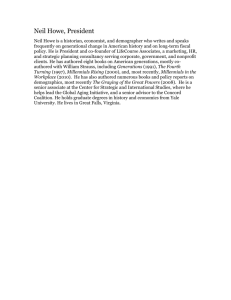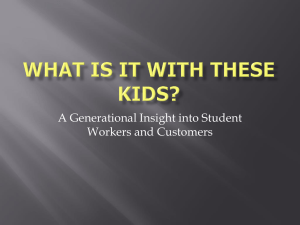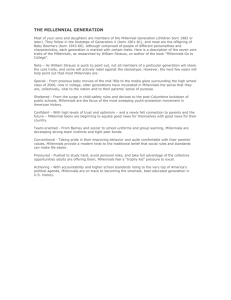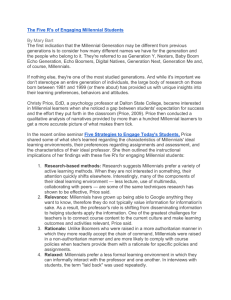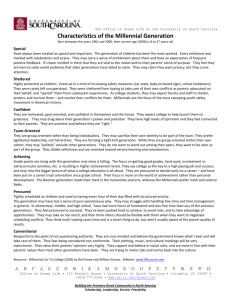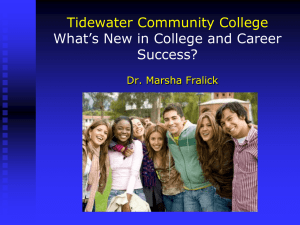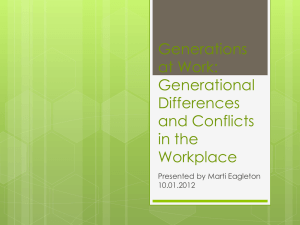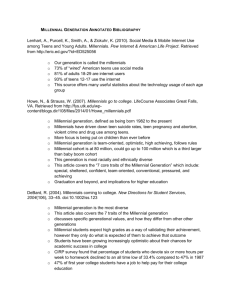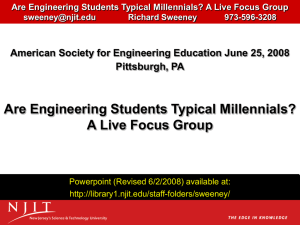Are Engineering Stud..
advertisement
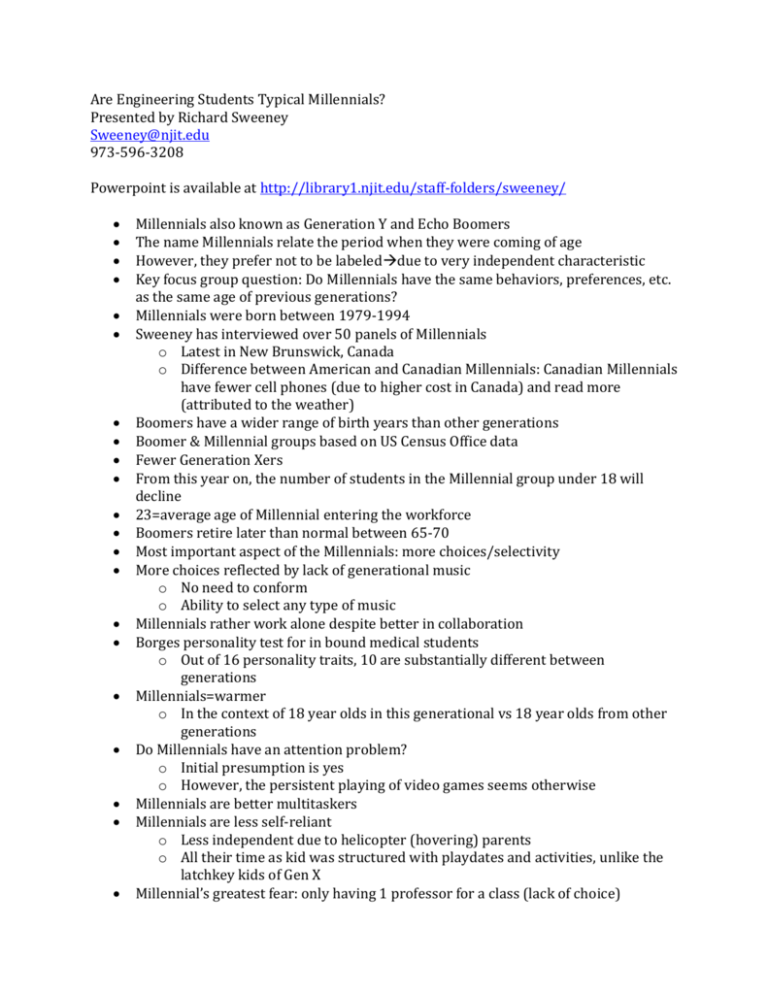
Are Engineering Students Typical Millennials? Presented by Richard Sweeney Sweeney@njit.edu 973-596-3208 Powerpoint is available at http://library1.njit.edu/staff-folders/sweeney/ Millennials also known as Generation Y and Echo Boomers The name Millennials relate the period when they were coming of age However, they prefer not to be labeleddue to very independent characteristic Key focus group question: Do Millennials have the same behaviors, preferences, etc. as the same age of previous generations? Millennials were born between 1979-1994 Sweeney has interviewed over 50 panels of Millennials o Latest in New Brunswick, Canada o Difference between American and Canadian Millennials: Canadian Millennials have fewer cell phones (due to higher cost in Canada) and read more (attributed to the weather) Boomers have a wider range of birth years than other generations Boomer & Millennial groups based on US Census Office data Fewer Generation Xers From this year on, the number of students in the Millennial group under 18 will decline 23=average age of Millennial entering the workforce Boomers retire later than normal between 65-70 Most important aspect of the Millennials: more choices/selectivity More choices reflected by lack of generational music o No need to conform o Ability to select any type of music Millennials rather work alone despite better in collaboration Borges personality test for in bound medical students o Out of 16 personality traits, 10 are substantially different between generations Millennials=warmer o In the context of 18 year olds in this generational vs 18 year olds from other generations Do Millennials have an attention problem? o Initial presumption is yes o However, the persistent playing of video games seems otherwise Millennials are better multitaskers Millennials are less self-reliant o Less independent due to helicopter (hovering) parents o All their time as kid was structured with playdates and activities, unlike the latchkey kids of Gen X Millennial’s greatest fear: only having 1 professor for a class (lack of choice) Prefer customization o They’ve had more choices available to them than any other generations Millennials are digital natives; everyone else is a digital immigrant All are on Facebook but none are on Second Life o Second Life involves too much time, money no immediate payoff Social networking is not trivial o Media has not been used in a peer to peer way o Ex: Having students help other peers and classmates with solving a math problem o Another example of the value of social networking: Wikipedia and Encyclopedia Britannica have about the same level of accuracy If Millennials are not being tested on something, they won’t study it Tests should be competency based, not just fact based All expect to earn more than their parents and work less hours Expectations of themselves are high Read less o Few read papers o Not reading the literature Millennials more often identify a library with books, while older generations identify a library with information Learning characteristics o Don’t read instructions o Trial & error methodology Defined sense of personal space o Don’t want to receive messages from professors or university via text message or IM Favorite events based on interactivity and engagement Consider lectures boring o Have to engage them with more than just clicking Personal tutoring has obvious benefits over traditional teaching o Tailored education needs o Ex: Biomedical Engineering Course Provide box of machines for students to build a machine to suture fingers Very impatient Want to do it faster Don’t want to learn things they don’t need to know Be an excellent teacher or help students be better learners? o Faculty reactions to this questions I don’t get it I don’t see a reason to change How can we change? Different concept of busy Hate busy work Want lots of personal feedback, all of the time Digital natives o Not necessarily Web 2.0 creators but they are using it You Tube o Want 3-5 minute segments and then test their skills Typically not just IMing 1 person only at a computer; probably working on other tasks or holding multiple conversations Problems with Millennial behavior o Ex: Multitasking considered rude to a professor teaching; more efficient use of time for the student Email=preferred mode of communication Women are heavier gamers All affected by gaming Experiential learning should be more like gaming, case studies, experiential, handson learning Practical & achievement oriented o Big decisions decided at the last minute Something better might come along Nomadic Like to pull information, not push info More likely to look online for a job than in a newspaper Viral marketing the best method Huge media consumers Question 1 With Millennials entering TA positions, have they adopted new teaching styles? A: No information as of yet Question 2 How does these attributes play out across the digital divide? A: Not everyone is at the same place at the same time but they all want to be. They figure out a way to get the technology that they need. The digital divide impacts speed but not general participation. Question 3 Do you ask the audience the test questions as a comparison? A: Different methodologies between Millennials and other generations in using technology. Student responses o Likely to ID with cut, cost, brand of jeans but no dominant type o Example of choice, non-conformity o Key characteristics of an ideal boss o Friendly, flexible, compassionate o Preferred communication style o 2/3 in person talking o email, IM o 10/12 iPod or Mp3 owners o 8/12 concerned about life/work balance o job searching method o social networking with professors or at conferences o all own a personal laptop o less than 10% bring it to class o 0 on Second Life o All on Facebook o More likely to have friends of different ethnicities

